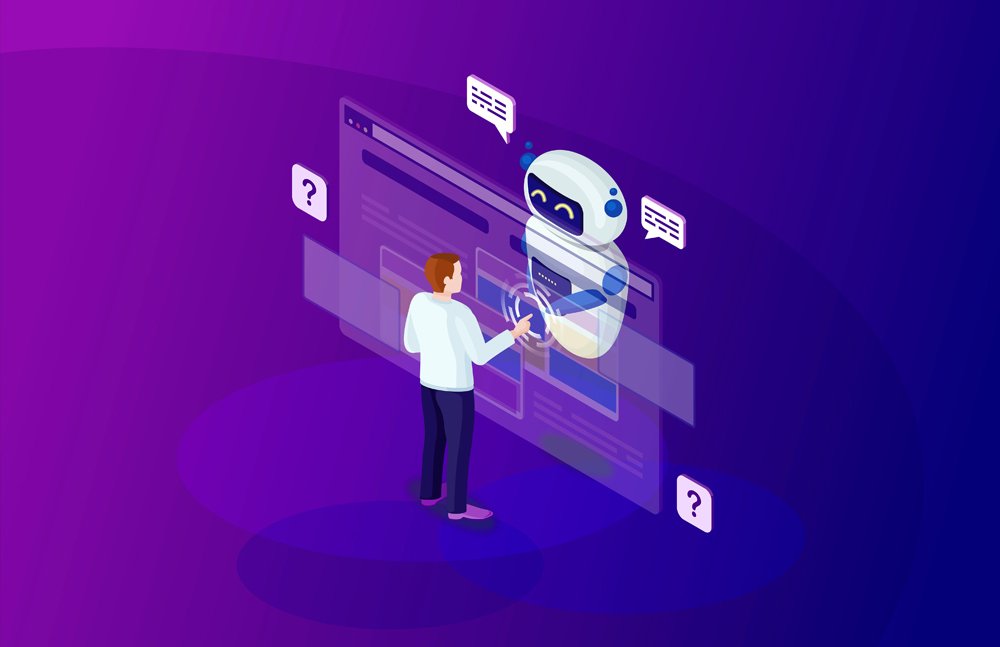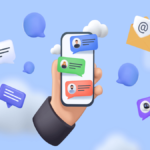According to the American poet and writer Maya Angelou, “People will never forget how you made them feel, but they will forget what they said and what you did.” The well-known quote encapsulates how crucial customer service is in the modern corporate environment. Because there are so many alternatives accessible to consumers nowadays, their behavior is erratic. Even little mistakes in customer service might cause brand loyalty to shift, and there are ways AI chatbots can improve customer service.
Providing exceptional customer service will draw in repeat business, improve the reputation of your company, save advertising expenses, and increase revenue. This is where customer care AI chatbots are useful. AI chatbots have revolutionized providing exceptional customer service with their immediate replies and capacity for constant updating.
Benefits Of AI Chatbots In Customer Service

1. 24/7 Availability
One of the ways AI chatbots can improve customer service is that they provide 24/7 customer service, guaranteeing that help is accessible even after regular business hours. At any time of day, they contribute to client happiness by offering timely support, whether it be in answering product questions or resolving problems.
The greatest example of using an AI chatbot for 24/7 customer service is Waste Connections. The company’s AI agent manages a large number of waste management requests around the clock with ease, only elevating complicated problems to real agents when necessary.
2. Multilingual Support
Customers are no longer restricted to purchasing at nearby physical stores thanks to internet shopping. Since consumers may purchase goods from any location in the world, removing communication barriers is essential to providing excellent customer service. Customers who speak various languages may get multilingual service from chatbots.
Chatbots may either ask the user what language they prefer at the beginning of a session or use artificial intelligence (AI) to guess the language based on user input. Multilingual bots can converse via chat, text, or voice in a variety of languages. AI may also be used with multilingual chatbots to carry out basic activities and respond to general inquiries in the language that the consumer prefers.
3. Better Response Time
To answer how AI chatbots can improve customer service, unlike a regular customer service representative, an AI chatbot responds instantly. It can handle many questions at once and doesn’t need to put clients on hold, avoiding any possible loss of clients as a result of delays.
The use of the AI chatbot Landbot by the Swiss Red Cross during the COVID-19 epidemic serves as one example of this. They used this technology to quickly assess potential volunteers in response to a volunteer shortage. Within a week, the chatbot successfully onboarded 500 volunteers while managing many applications at once.
4. More Consistent Support
Rarely do customers who contact you often speak with the same support worker twice. Customers may encounter discrepancies while interacting with support teams due to the fact that agents differ in their degrees of training and experience.
Chatbots operate according to preset frameworks and always get responses from a single source of truth, which produces consistent customer care experiences even if the majority of organizations are always trying to improve their customer service training.
Additionally, chatbots are designed to provide rational advice regardless of the length of the discussion or the customer’s behavior. Chatbots may provide an empathic customer experience (CX) when a customer is impolite or dismissive by identifying and reacting to language that conveys irritation or rage.
5. Cost-Effective
One of the ways AI chatbots can improve customer service is that, by working constantly without breaks or extra pay, an AI chatbot reduces labor costs. Its scalability is ensured by its capacity to handle many client requests at once, handling bigger volumes without raising human expenses.
Additionally, its effectiveness in quickly answering questions leads to reduced handling times and possible savings in operating costs. For instance, Chatfuel effectively supports several clients at once across a variety of channels. Based on a customer’s behavior, it responds to basic inquiries and delivers personalized messages.
6. Offer Self-Service Options
According to a recent poll, 37% of agents said that when consumers are unable to do basic activities on their own, they get irritated or worried. Chatbots may lessen that by offering self-service alternatives, enabling users to swiftly locate information when it’s most convenient or handle simple problems on their own.
For instance, Zendesk bots may link users to help center articles, FAQ pages, and community forums. In order to respond to frequently asked client inquiries, they may also extract data from your current knowledge base. Over time, chatbots provide improved self-service alternatives because they learn from each contact.
7. Personalized Interactions
AI chatbots may provide individualized consumer encounters when integrated with other corporate systems, such as a CRM. Using the customer’s information, the AI bot can quickly authenticate the user and respond with tailored messages.
The ideal answer to how AI chatbots can improve customer service that offers individualized customer service is Zendesk AI. In addition to integrating with the company’s CRM to provide tailored replies, it speaks in a naturally human tone.
8. Proactive Customer Service
Chatbots can assist businesses in offering clients proactive assistance and recommendations. Businesses may use chatbots to proactively interact with consumers by tracking user behavior on their websites. This allows them to respond to frequently asked inquiries and assist with any possible problems on the page.
A chatbot might be used, for instance, by an online retailer to welcome a repeat customer and alert them when the amount of goods in their basket is running low. Alternatively, a financial services organization may utilize a bot to anticipate frequently asked questions when a customer applies for a loan and provide customized information to assist with the completion of their applications.
In order to aid clients with any problems that are delaying a purchase, chatbots may also recognize when a handoff is appropriate and proactively inquire if they would like to speak with a sales representative or support agent.
9. Omnichannel Support
To communicate with companies, consumers use a variety of platforms, including social media, messaging applications like WhatsApp Business and Messenger, email, and the phone. Regardless of the channel or device they’re using, they anticipate that conversations will flow naturally across platforms so they can pick up where they left off.
However, this kind of expertise isn’t provided by many companies. You may employ bots to respond to frequently asked queries via email, your website, Slack, and your different chat applications to differentiate yourself from the competition. Connect interactions and provide a consistent, seamless experience by integrating your AI chatbots with the rest of your software stack. On their chosen channel, your consumers will get the answers they want faster.
Limitations Of AI Chatbots In Customer Service
As businesses increasingly adopt AI chatbots for customer service, it’s essential to recognize their limitations. While these tools can enhance efficiency and provide quick responses, they fall short in several key areas that can impact customer satisfaction and service quality.
Lack of Human Empathy: One of the most significant limitations of AI chatbots is their inability to convey empathy and emotional understanding. While they can simulate conversation and respond to queries, they lack the human touch necessary for dealing with sensitive issues. Customers often seek reassurance and understanding, particularly when faced with frustrations. A chatbot may provide a factual response but cannot offer the warmth or compassion that a human agent can.
Limited Problem-Solving Abilities: AI chatbots operate based on predefined algorithms and machine learning models. They excel at handling straightforward inquiries but struggle with complex or unique problems that require critical thinking or creativity. When faced with intricate issues, chatbots can either provide incorrect solutions or redirect customers to human representatives, leading to longer resolution times and frustration.
Dependence on Data Quality: The effectiveness of a chatbot heavily relies on the quality of the data it has been trained on. If the data is outdated, biased, or insufficient, the chatbot may provide inaccurate or irrelevant responses. This limitation can undermine customer trust and satisfaction, particularly if the chatbot fails to address the customer’s specific needs or context.
Language and Context Challenges: While many chatbots are designed to understand multiple languages and dialects, they still struggle with colloquialisms, idioms, and nuanced language. Misinterpretation of customer queries can lead to incorrect responses, aggravating users. Additionally, chatbots may fail to grasp the context of a conversation, leading to repetitive or irrelevant exchanges.
Inability to Handle Escalations: When issues become too complex for a chatbot, it often requires escalation to a human representative. However, this transition can be cumbersome. Customers may need to repeat their queries, leading to frustration. A seamless handoff is crucial for maintaining customer satisfaction, yet many systems still struggle with this aspect.
While there are many ways AI chatbots can improve customer service, their limitations highlight the need for a balanced approach. Businesses should integrate chatbots as a first line of support while ensuring that human agents are readily available for more complex interactions. A hybrid model can enhance the customer experience, combining the speed of AI with the empathy and problem-solving abilities of human representatives.
FAQ
Q: How do chatbots enhance the shopping experience?
A: By providing immediate assistance, cutting down on wait times, and making pertinent product recommendations that suit the consumer’s requirements and preferences, AI chatbots increase customer happiness.
Q: How can chatbots support the expansion of your small business?
A: Chatbots may help consumers without additional manpower by responding to frequently asked queries and offering multilingual support, which improves customer satisfaction and lowers the number of requests for human assistance.
Q: Are chatbots preferred by consumers?
A: According to data from CivicScience, 17% of customers who had a positive encounter with customer service in the past said they would rather communicate with a chatbot, which is four times more than those who weren’t.






